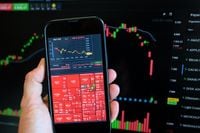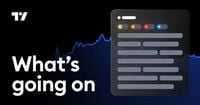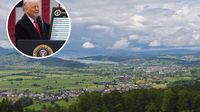On April 9, 2025, China began censoring tariff-related content on social media platforms in response to the United States' implementation of reciprocal tariffs, which included a staggering 104 percent duty on Chinese goods. This move comes as tensions escalate between the two economic giants, with China preparing for a broader trade conflict. The censorship effort notably targeted hashtags related to tariffs and the number '104' on Weibo, a popular Chinese social media platform. Users attempting to search for these terms were met with error messages, while discussions about the U.S. egg shortage gained traction, reflecting a shift in narrative.
According to state broadcaster CCTV, the U.S. is "waving the tariff whip" while simultaneously sending quiet requests to European nations for eggs, highlighting the irony of the situation. This commentary underscores China's view of the U.S. as an irresponsible trade partner. Last week, Beijing announced its own retaliatory tariffs, vowing to combat what it perceives as economic coercion from Washington.
The Internet censorship in China is part of a broader strategy to control the narrative surrounding the trade dispute. The country employs a system known as the "Great Firewall" to block foreign social media platforms like Instagram and X, creating a market for domestic alternatives. Pang Jiulin, a prominent lawyer with over 10.5 million followers on Weibo, expressed concerns that China's exports to the U.S. could be quickly supplanted by countries like Vietnam and India. He emphasized that Chinese companies might lose their ability to export to the U.S. entirely if the tariffs remain in place.
"If China raises its tariffs to 104 percent as well, prices for American goods, including Apple and Tesla products, will surge, forcing Chinese consumers to pay more for their favorite American brands," Pang warned. The dynamics of the trade relationship are complex, as China exports approximately three times more goods to the U.S. than it imports, making a tit-for-tat tariff strategy potentially less effective.
The Shanghai Composite Index experienced a significant drop of 7 percent on April 7, 2025, marking the worst day for the index in five years. However, it rebounded to close higher on April 9, reflecting government assurances to support local markets amidst the turmoil. Hu Xijin, a notable commentator, criticized the U.S. administration, stating, "Trump's team is truly delusional. They are not just at war with the entire world but also with the fundamental rules of human society, making their chances of victory zero." He added that the reciprocal tariffs would be remembered as a "pillar of shame in history" for future generations.
In a separate commentary, Justin Thomson, head of the T. Rowe Price Investment Institute, addressed the implications of the U.S. tariff policy. He noted that the tariffs announced on what he referred to as "Liberation Day" were shockingly higher than anticipated, featuring a base rate of 10 percent alongside additional country-specific tariffs. Thomson explained that these tariffs were calculated in a manner he deemed "questionable," expressing concern over the potential for a reversal in portfolio flows into the U.S. due to a loss of confidence in U.S. economic policy.
Thomson emphasized that while tariffs could have deflationary effects on countries exporting to the U.S., they simultaneously damage domestic economic confidence. He stated, "The likelihood of further Fed interest rate cuts has increased," suggesting that the current climate could lead to lower interest rates in both developed and emerging economies. He warned that the global trading landscape would continue but would undergo significant restructuring, resulting in both winners and losers.
Meanwhile, businesses in the Linth region have begun to feel the impact of the announced U.S. tariffs, even those that do not directly export to the U.S. A recent survey indicated that local companies are bracing for the economic fallout. This sentiment is echoed in the pharmaceutical sector, where companies like Novartis are reacting swiftly to the impending tariffs. Despite medicines being exempt from the new tariffs, Novartis has ramped up cargo flights from Euro-Airport Basel to ensure their products reach the U.S. before the tariffs take effect.
Last week, three full freighters were reported at Euro-Airport, heading to various U.S. airports. The airport has a cargo facility specifically designed to meet the needs of the pharmaceutical industry, which has seen a noticeable increase in export volume to the U.S. since the beginning of the year. However, recent tariff announcements have led to a slight cooling in export activity, as companies adopt a more cautious approach.
The media office at Euro-Airport confirmed that shortly before the official announcement of the punitive tariffs, there was a significant uptick in cargo flights, primarily carrying pharmaceutical goods. Although the pharmaceutical sector has so far been insulated from tariffs, the fear of future changes looms large. One airport spokesperson noted, "The market seems to be in a wait-and-see mode at the moment."
As the trade tensions escalate, the broader implications for global markets remain uncertain. Thomson pointed out that while markets can adapt to protectionist policies, they struggle to cope with chaos. He suggested that as long as there is uncertainty regarding the reasons behind the tariffs, the markets will experience dissonance. He advocated for a cautious approach, advising investors to refrain from drastic portfolio shifts in response to immediate market reactions.
The unfolding situation highlights the delicate balance between economic policy and international relations, as both the U.S. and China navigate a path fraught with potential pitfalls. With the stakes higher than ever, the global community watches closely to see how these developments will shape the future of trade.









